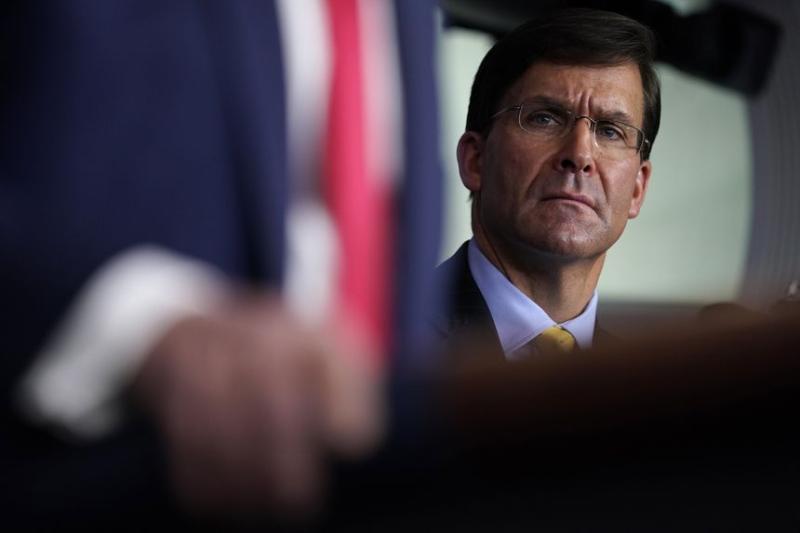'A Sacred Oath' Review: Keeping the Peace
By: John Bolton (WSJ)



'I want to go in," said the commander in chief. "We need to show them force." He was disturbed by events that, he said, "make us look weak," "stupid" and "pathetic." These hawkish comments to Defense Secretary Mark Esper did not refer to sending U.S. forces into combat overseas, but to subduing rioters in Portland, Ore.
Why violate conservative principles of federalism, under which state and local officials handle lawless mobs? Why not allow governors, who are accountable to their states' voters, to decide whether to mobilize National Guard units if law-enforcement capabilities prove inadequate?
For President Trump, the answer was simple. “I’m running for reelection and we have cities burning down. . . . We have to go and do something. . . . You need to shoot that person [that throws a rock at you].” This is Donald Trump simpliciter. Issue: Riots undercutting his political prospects. Answer: The Pentagon must use force to set things right.
Portland was hardly unique, as Mr. Esper documents in “A Sacred Oath,” another important brick in the wall of evidence that Mr. Trump should never again be president. In roughly 16 months as secretary of defense, Mr. Esper experienced enough of Mr. Trump to choose being fired rather than retreating from his oath of office.
Mr. Esper details the all-consuming task of managing America’s largest and most vital cabinet department—instructive reading for those unfamiliar with what operationalizing national security policy decisions involves. Time and again, he shows how presidential inattention, ignorance, incuriosity, duplicity and unwillingness to take responsibility for hard decisions all put the United States at risk. Mr. Trump’s “views on the use of force swung back and forth like a pendulum,” he writes, “though even a pendulum has some predictability. The president rarely gave us much at all.”
Consider Mr. Trump’s unvarnished view of the military. He loved pomp and pageantry, such as July 4 military flyovers in Washington, which Mr. Esper and others struggled to keep within commonsense limits. Behind closed doors, however, Mr. Trump’s views were shockingly unlike any prior U.S. president’s. In a May 2020 meeting with the Joint Chiefs of Staff, Mr. Trump, unprovoked, vented for 20 minutes about how “the great U.S. military isn’t as capable as you think” because we couldn’t even “win in Afghanistan, a third-rate country.” The Chinese military was superior to ours, the president said, because “the U.S. Navy ships are ugly and broken.” Then the clincher: “For all the money being spent on the military—$2.5 trillion that I gave you to rebuild the military—you can’t fight. You can’t win.” Mr. Esper concludes that “in Trump’s mind, when it came to defense spending, he was done.”
After the first impeachment acquittal, “a darker, more aggressive evolution of the Trump White House” emerged. When, for example, Mr. Trump sought to invoke the Insurrection Act against domestic rioters (who deserved the fullest measure of legal punishment but not U.S. combat forces), Mr. Esper feared the military would become dangerously entangled in domestic politics. To shield the military, he publicly opposed resorting to the act’s provisions, thus guaranteeing his dismissal after the 2020 election.
Both Democrats and Mr. Trump’s most committed supporters are criticizing this memoir without waiting to read it. For some, serving at all in the Trump administration was ignominious, a perspective both unfair and dangerous. They believe Mr. Esper should have resigned, gone public with his stories, and thereby provided instant gratification to Mr. Trump’s manifold opponents. By contrast, he calls the remain-or-resign dilemma “the existential question of the Trump administration: Why did good people stay even after the president suggested or pressed us to do things that were reckless, or foolish, or just plain wrong?” While quitting would have made him “feel good in the moment,” Mr. Esper worried about who Mr. Trump would name to replace him, thereby risking even more seriously the military’s politicization.
For others, the author is disloyal to Mr. Trump, breaching trust with him and colleagues still in public life, revealing behavior and remarks thought to have been private. This criticism is simultaneously cynical and naive. Anyone who thinks life in government is private forever hasn’t learned from our history, starting with George Washington’s cabinet members anonymously assaulting each other in the press from early in his first term. If this explanation is unsatisfying, please refer to Harry Truman’s observations about heat and kitchens.
The memoir’s title embodies what Mr. Esper and other national security officials were about, trying to serve their country, not one individual. White House chief of staff Mark Meadows ultimately called to fire Mr. Esper on Nov. 9, 2020, Mr. Trump not having the courage to do it man-to-man. Mr. Esper responded: “That’s the president’s prerogative. My oath is to the Constitution, not to him.” This is critical. Joining a presidential team is not joining the Mafia and its code of omertà. Service is to America, whose people can hardly govern themselves if they don’t know what goes on inside their government. (Mr. Esper’s manuscript endured the federal government’s broken, sometimes corrupt, prepublication review process, so it presents no issue of classified information.)
Writing at book-length rather than flashing through the ephemeral worlds of TV and social media is more helpful to future generations than virtue signaling for momentary applause. When the memoirs of defense secretary Robert Gates appeared in 2014, I wrote that “former senior officials have virtually an obligation to explain what they did . . . Press accounts and ‘instant histories’ are far too often lacking in insight and understanding of the government in operation.”
I still believe this. “A Sacred Oath” is not a gratuitous tell-all. It is a work of history. Mr. Esper has his perspectives, to which he is entitled, but his willingness to go on the record at length is invaluable. Look forward to the reaction from Mar-a-Lago.
Mr. Bolton, a former U.S. ambassador to the U.N., served as national security adviser from April 2018 to September 2019.

Tags
Who is online
59 visitors


Bret Baier interviewed Mark Esper the past two nights. He asked Esper why he didn't resign since he disagreed with Trump's policies. Esper responded that he was afraid Trump would replace him with someone who would support those policies.
Does anyone here understand what is wrong with that kind of reasoning?
The book is:
A Sacred Oath: Memoirs of a Secretary of Defense During Extraordinary Times
By Mark T Esper.
Has it dawned on you yet that Trump was not fit for office ?
Has it dawned on you yet if that were the case he wouldn't have lasted 6 months with so many ways to oust him from office? And NOT A SINGLE FUCKING ONE OF THEM WORKED.
Then he must have worked miracles in all that he accomplished.
You posted this article, which clearly implies that Trump was not fit to hold office.
Does it?
It is a book written by an official trying to subvert a President's policy. People can draw their own conclusions about Esper and that is really what it's about.
Biden has really hurt this country. What would you say if he had officials trying to undermine him?
Why would Mark Esper want to subvert Trump's policy? He is a Republican conservative. Isnt that what Trump is?
Esper went in thinking that Trump couldnt possibly be as bad as he had heard, and Secretary Of Defense is a very prestigious position. He wanted it to work, but concluded that Trump was not fit for office. He was asked the other day if he could vote for Trump for president in 2024 and Esper said no.
Many Trump supporters continue to deny reality.
Really?
Trump did great things for this country. You keep using the term "unfit." If you want to see what that looks like check out what is trending on Truth Social:
He was obviously more fit than Biden and what's-her-name are.
this coming from the person who supports a president who tried to shake the hand of somebody who wasn't there.
That nonsense was debunked by numerous fact checkers. Biden was gesturing to people who were in the audience. It is as plain as day when you examine the video with any sort of fairness.
You are a good example of why Trump supporters are considered conspiracy nuts.
[removed]
Let's see: Inflation is at 8%, we’re out of baby formula, the border is completely overrun, and nobody can afford gas and somehow the other guy was "unfit!"
Trump was completely unfit to hold office on election day 2016, let alone 6 years later. He is a buffoon, a moron, a habitual liar, and a crook. What part of all that do you not understand?
It's like a little jingle without any relation to reality.
There has been investigation after investigation into all that and the evidence of this is where? Oh that's right, there isn't any of it.
What century do you live in?
As usual, you fail to make a valid point, then resort to insults.
[deleted]